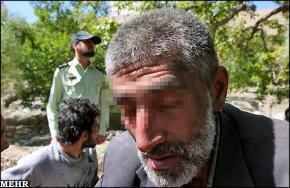ID :
96345
Tue, 12/22/2009 - 16:03
Auther :
Shortlink :
http://m.oananews.org//node/96345
The shortlink copeid
UNODC calls for inclusion of Iran in solving Afghan drug problem

TEHRAN, Dec. 22 (MNA) -- The United Nations Office on Drugs and Crime (UNODC) has applauded Iran’s counter-narcotics enforcement efforts and has urged the international community to take Iran’s interests into account in identifying options for transnational and regional cooperation on this issue.
The UNODC representative in Iran, Antonino De Leo, was speaking a few days ago at an international workshop in Germany on “Partners for Stability: Involving Neighbors in Afghanistan’s Reconstruction - Transatlantic Approaches”, UN Information Center (UNIC) in Tehran reported.
He called for the engagement of Iran at the regional and national levels. He proposed three regional and one national, but complementary initiatives, for cooperation to counter narcotics trafficking.
The first is the Triangular Initiative in the field of counter-narcotics enforcement, brokered by UNODC in 2007. It is one of the seven priority areas of the Rainbow Strategy to tackle the Afghan problem. It seeks to get the anti-narcotics authorities of Iran, Afghanistan, and Pakistan to work together, share intelligence and launch simultaneous and joint operations, leading to drug seizures and arrests of drug smugglers.
The second area of cooperation is in the field of Mutual Legal Assistance on which UNODC is currently working. The purpose of this is to improve judicial cooperation and exchange of judicial information among prosecutors and judges involved in investigations of drug-related felonies, money laundering and transnational crimes.
The third area that UNODC is pursuing is on fostering drug demand reduction and HIV cooperation. Iranian policy and experience on drug abuse prevention, treatment and rehabilitation, as well as on HIV/AIDS are indeed good practices that could benefit its two neighbors.
“A new multilateral technical assistance program on drugs and crime – the fourth area of cooperation -- is also in the pipeline for 2010. It is planned to be developed through a collaborative approach led by Iran, UNODC, the Mini-Dublin Group and the EU Presidency,” De Leo said.
He stated that “engaging Iran in finding a solution to the Afghan drug challenge is not only desirable but necessary. Drug control is high on the agenda of the government in Iran. The country is perhaps the most committed and capable counter narcotic partner in the region. Its experience, knowledge and capability could be an asset to the sub-region and the region at large.”
De Leo emphasized that “a regional effort that includes Iran in a solution to the Afghan drug problem must embed measures to address Iran’s specific counter narcotics needs. Such a technical program should be devised, agreed upon, funded and implemented in a participatory way.”
The UNODC representative in Iran, Antonino De Leo, was speaking a few days ago at an international workshop in Germany on “Partners for Stability: Involving Neighbors in Afghanistan’s Reconstruction - Transatlantic Approaches”, UN Information Center (UNIC) in Tehran reported.
He called for the engagement of Iran at the regional and national levels. He proposed three regional and one national, but complementary initiatives, for cooperation to counter narcotics trafficking.
The first is the Triangular Initiative in the field of counter-narcotics enforcement, brokered by UNODC in 2007. It is one of the seven priority areas of the Rainbow Strategy to tackle the Afghan problem. It seeks to get the anti-narcotics authorities of Iran, Afghanistan, and Pakistan to work together, share intelligence and launch simultaneous and joint operations, leading to drug seizures and arrests of drug smugglers.
The second area of cooperation is in the field of Mutual Legal Assistance on which UNODC is currently working. The purpose of this is to improve judicial cooperation and exchange of judicial information among prosecutors and judges involved in investigations of drug-related felonies, money laundering and transnational crimes.
The third area that UNODC is pursuing is on fostering drug demand reduction and HIV cooperation. Iranian policy and experience on drug abuse prevention, treatment and rehabilitation, as well as on HIV/AIDS are indeed good practices that could benefit its two neighbors.
“A new multilateral technical assistance program on drugs and crime – the fourth area of cooperation -- is also in the pipeline for 2010. It is planned to be developed through a collaborative approach led by Iran, UNODC, the Mini-Dublin Group and the EU Presidency,” De Leo said.
He stated that “engaging Iran in finding a solution to the Afghan drug challenge is not only desirable but necessary. Drug control is high on the agenda of the government in Iran. The country is perhaps the most committed and capable counter narcotic partner in the region. Its experience, knowledge and capability could be an asset to the sub-region and the region at large.”
De Leo emphasized that “a regional effort that includes Iran in a solution to the Afghan drug problem must embed measures to address Iran’s specific counter narcotics needs. Such a technical program should be devised, agreed upon, funded and implemented in a participatory way.”





